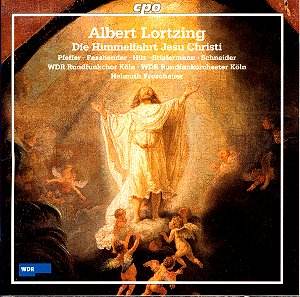Born into a theatrical family, Lortzing composed
a number of Singspiels, most famously 'Zar und Zimmerman' (1837)
and 'Der Wildschutz' (1842) as well as a romantic opera ('Undine')
and a revolutionary opera ('Regina'). His 'Hans Sachs' probably
influenced Richard Wagner. But Lortzing did not only write operas.
He states in his autobiography that the expectations of his audience
constrained him to constantly present entertaining works and but
he seems to have written a number of more serious works.
'Die Himmelfahrt Jesu Christi' was first performed
in Munster at the City Theatre in 1828 shortly after Lortzing's
one act comedy 'Ali Pascha von Jenina' was performed. This was
two year's after Weber's 'Oberon', a year after Beethoven's death,
the same year as Schubert's death, and a year before the first
performance of Rossini's 'William Tell' in Paris.
'Die Himmelfahrt' was first performed in Münster
and then a year later in Osnabruck as part of a concert which
included an opera overture, several arias including one from Mozart's
'La Clemenza di Tito' and a 'Hymn to Harmony' by Ignaz von Seyfried.
In many ways it should not be regarded as an oratorio, more as
a religious opera. It is written for chorus, orchestra along with
five soloists - Gabriel (soprano), Eloa (alto), Christ (tenor),
St. John (baritone), St. Peter (bass). The piece opens with a
chorus of Angels and then in an accompanied recitative (all the
recitatives in the piece are accompanied) St. John, sung by Christian
Hiltz, explains that the disciples have come to the Mount of Olives
as instructed by Christ. Hiltz has a pleasing light baritone that
almost makes you think he could be a tenor. Then in an aria 'Blow
Loudly to Zion with trumepts' Gabriel informs the listeners that
Christ is Lord. Gabriel is sung by soprano, Anneli Pfeffer and
is most impressive in this aria with its hints of Mozart, Weber
and Haydn's 'Creation'. Following this Eloa, sung by Hedwig Fassbender,
recites the passage from St. John's gospel, 'In the beginning
was the Word…'. Fassbender displays a rich contralto instrument
in this dramatic, atmospheric recitative. The recitative is followed
by a rather conventional quartet for Gabriel, Eloa, John and Peter
in which Christ's earthly life and suffering are recalled. John,
in a recitative, graphically depicts all the suffering that occurred.
Lortzing's orchestration at this point very effective, pointing
up the graphic words. Unfortunately, Hiltz's baritone sounds rather
uncomfortable with the lower tessitura of the piece. Then he and
Gabriel, in a touching duet with charming solos, lament the loss
of a friend. In a recitative and bravura aria 'The women did not
see him in the tomb', Peter describes Christ's resurrection. Peter
is sung by bass Kay Stieffmann and he also sounds a little taxed
by the lower notes, but he has a very effective, dramatic bass
voice with a fine feeling for the words. Part 1 concludes with
another chorus of Angels.
Part 2 opens with a recitative and aria 'O great
salvation has been given to you' from the risen Christ himself
who is sung by tenor Bernhard Schneider. Schneider has a light,
bright clean toned voice. The aria is essentially lyrical, but
ideally Christ should have a bit more weight than Schneider can
provide, but the high tessitura of the piece holds no fears for
Schneider. In a dramatic and very operatic chorus, the disciples
implore him 'Let us not be forsaken'. Christ then prays to God
the Father, 'I have revealed your name' and again Schneider lacks
that essential element of heft that the Weberian dramatics of
the aria require. In a trio, Christ, Gabriel and Eloa then praise
faith as the greatest good. Then the chorus of disciples sees
Lord of truth surrounded by the heavenly host. Christ then vanishes
into Heaven amidst a highly operatic ensemble. The work concludes
with a short recitative from Peter and an operatically dramatic
Chorus of Angels.
This is a fine, committed performance of the
work and should do much to raise interest in Lortzing's non-operatic
output. The young cast give fine performances even though I felt
that the three men had voices a half-size smaller than was desirable.
They are well supported by the clean, bright choral tones of the
WDR Rundfunkchor and the WDR Rundfunkorchester. Helmuth Froschauer's
speeds are generally apt and he encourages a performance that
is far from routine.
Robert Hugill
